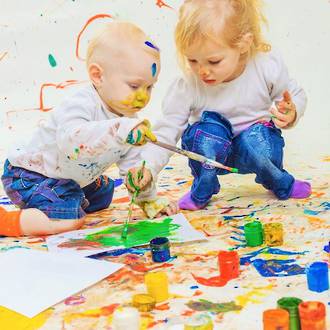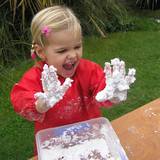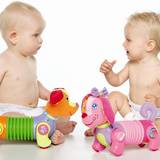Questions to ask preschoolers about their artwork
|
Young children love to paint and draw, build and sculpt and when they present us with their artworks it’s easy to tell them that they’ve done a great job - whatever the results! However with a few open-ended questions you can find out a little more about what they’ve produced and what inspired them. You’ll also help develop their creative and critical thinking skills in the process.
|
You might also be interested in ...
Benefits of messy play for preschoolers
Messy play is so much fun and comes with numerous benefits for preschoolers. From playing with water in the bath to creating something with playdough, experimenting with paint and lots of other exciting activities. Messy play provides preschoolers with a great opportunity to learn through unstructured play. There are so many ways preschoolers can benefit and have fun with mess!
The plus side of play dates
Are play dates really necessary when kids are young? We take a look at some of the benefits and developmental effects play dates can have on older babies, toddlers and pre-school kids when they catch up with their friends.







However with a few open-ended questions you can find out a little more about what your preschooler has produced and what inspired them.
You’ll also help develop their creative and critical thinking skills in the process.
Questions to ask preschoolers about their artwork
There are so many questions you could ask your preschooler about their artwork, but here are some easy ones you can use to get them to talk about their latest piece of art.
You can also adapt or simplify the questions for toddlers or older children.
By taking an interest in what your preschooler has created, you are supporting them and helping them to express their own ideas.
1. What can you tell me about your picture, sculpture etc?
This is a good open-ended question and offers an opportunity for your preschooler to talk you through the different elements of their piece.
It also lets you off the hook if you’re not quite sure exactly what they’ve created!
2. Where did you get your idea?
This question gives your preschooler a chance to tell you about what inspired their artwork and where their idea came from.
Often it’s things that are currently top of their mind.
3. What is your favourite part?
Ask your preschooler to tell you about their favourite part of their masterpiece.
Follow up with questions such as ‘Why do you like that part’ and ‘What do you think makes that part work so well?’.
4. Why did you use …?
By asking your preschooler questions about the colours, shapes and textures they've used, it shows them that you have noticed even the smallest of details.
It also shows you have taken an interest in what they have done and helps to build their self-esteem.
5. What title would you give this piece of art?
Naming something always makes it more personal and meaningful.
Giving your preschooler's artwork a title or name will also help prompt them to think more about the main elements or theme of their masterpiece.
6. What materials did you use?
Talk to your preschooler about what they used to get to the finished product.
Ask them to tell you about the paints or crayons they have used, any arts and craft materials, glue, cardboard or anything else that helped them make their creation.
7. Where should we keep this work of art?
Preschoolers are often very proud of what they have created, so it’s important to respect this and discuss how they would like to display their artwork.
Will you hang it on the fridge, save it in a scrap book or put it on a shelf or into a folder to keep?
Alternatively, they may decide to give it to a family member or to a friend, or that today’s work was fun, but it can be recycled to free up some space for next time.
More kids activity articles to enjoy:
- The importance of drawing
- Make your own puffy paints
- Getting creative with your under 5s
Image source: henfamily.com